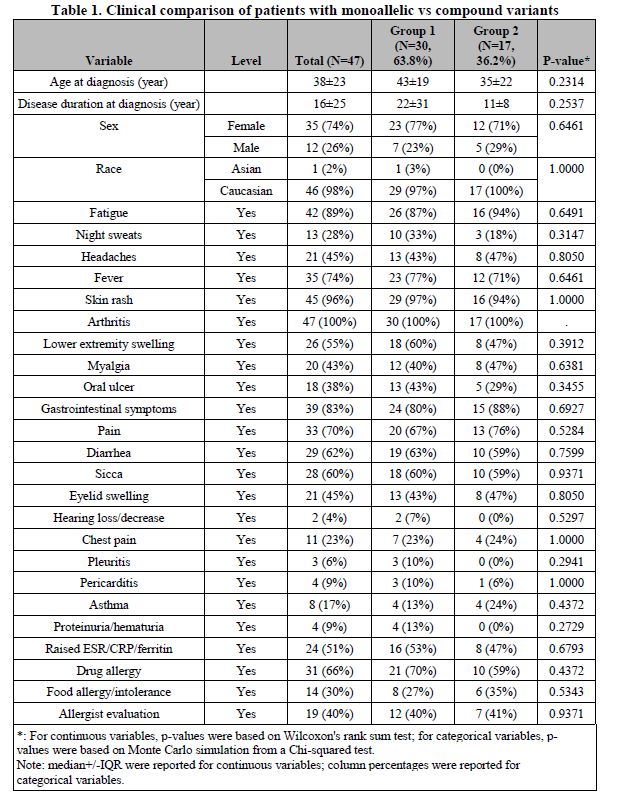Session Information
Date: Monday, November 13, 2023
Title: (1124–1154) Miscellaneous Rheumatic & Inflammatory Diseases Poster II
Session Type: Poster Session B
Session Time: 9:00AM-11:00AM
Background/Purpose: Yao syndrome (YAOS, OMIM 617321) is formerly designated NOD2-associated autoinflammatory disease. A spectrum of NOD2 mutations have been associated with this disease. Most patients carry compound variants and a minority carry monoallelic variant. This study aimed to compare clinical manifestations between patients with certain NOD2 sub-genotypes.
Methods: A single center retrospective study of a cohort of adult patients with YAOS was conducted.All patients underwent genetic testing for periodic fever syndrome gene panel. YAOS was diagnosed based on our published criteria, i.e., the presence of characteristic clinical phenotype and genotype with exclusion of other related diseases. This study was approved by the Institutional Review Board of Stony Brook University.
Results: There were a total of 47 patients who carried NOD2 mutations, and nearly all were Caucasian with female 74%. Mean age at diagnosis was 38±23 years and disease duration 16±25 years. All patients possessed complete or incomplete constellations of autoinflammatory features, such as recurrent fever, rash, polyarthralgia, myalgia, gastrointestinal symptoms and chest pain among others. Approximately 50% of patients had elevated acute phase reactants. Based on our prior publications and experience, most patients with YAOS carry the NOD2 variant, IVS8+158 and another concurrent NOD2 variant, such as R702W or 1007fs. In this study, 47 patients were divided into two groups:patients with carriage of NOD2 IVS8+158 only (N=30, 63.8%, Group1) and those with compound variants, IVS8+158/R702W or 1007fs (N=17, 36.2%, Group 2). We asked whether there would be differences of clinical manifestations between the two groups. Our study has found no statistically significant differences (Table 1). This study result was in agreement with our clinical observation that patients had similar clinical phenotype regardless of the sub-genotypes. Because these NOD2 variants are of low penetrance, YAOS has been recently reclassified as the new category of genetically transitional disease, where mutation is necessary but not sufficient to cause disease. The pathogenesis of YAOS may involve the interaction of the candidate gene, genetic background and environment.
Conclusion: Our study suggests that clinical phenotype is similar between YAOS patients with NOD2-subgenotypes. These variants serve as useful diagnostic markers for the disease.
References
Yao Q, et al. Genetically transitional disease: a new concept in genomic medicine. Trends Genet 2023; 39(2):98-108 Yao Q, Shen B. A Systematic Analysis of Treatment and Outcomes of NOD2-Associated Autoinflammatory Disease. Am J Med. 2017;130(3):365 e13-365 e18. Navetta-Modroc B, et al.A novel nucleotide-binding oligomerization domain 2 genetic marker for Yao syndrome. J Am Acad Dermatol. 2023 Feb 28:S0190-9622(23)00282-7.
To cite this abstract in AMA style:
Saif A, Nomani H, Hwang F, Yang J, Yao Q. A Comparative Study of Clinical Phenotype in Relation to NOD2 Sub-genotypes in Yao Syndrome [abstract]. Arthritis Rheumatol. 2023; 75 (suppl 9). https://acrabstracts.org/abstract/a-comparative-study-of-clinical-phenotype-in-relation-to-nod2-sub-genotypes-in-yao-syndrome/. Accessed .« Back to ACR Convergence 2023
ACR Meeting Abstracts - https://acrabstracts.org/abstract/a-comparative-study-of-clinical-phenotype-in-relation-to-nod2-sub-genotypes-in-yao-syndrome/

